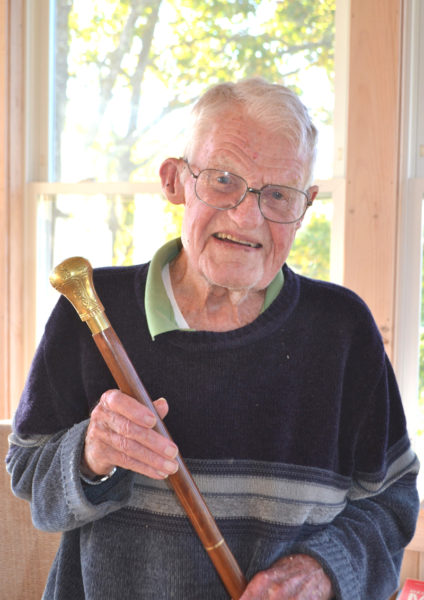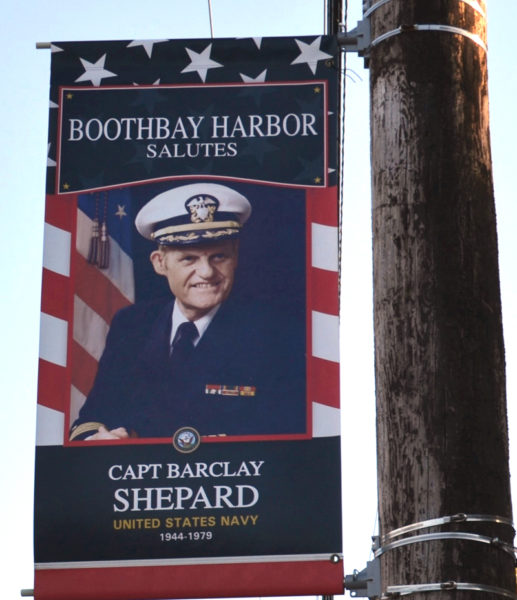
Dr. Barclay Shepard, a 22-year Navy veteran, proudly holds Boothbay Harbor’s Boston Post Cane, presented to him in honor of his status as the oldest citizen in town. (Charlotte Boynton photo)
On Monday, Nov. 11, the country celebrates Veterans Day, a day set aside each year to honor and pay tribute to the men and women who have served and continue to serve in the U.S. military, protecting the freedoms this country enjoys.
U.S. Navy Capt. Dr. Barclay Shepard, of Boothbay Harbor is one of those veterans.
After traveling all over the world in service to his country, humanity, and his church, the 98-year-old lives in his hometown, on property purchased by his grandparents over a century ago and from where he continues to be an active participant in his community.
Shepard was born at St. Andrews Hospital in Boothbay Harbor on June 16, 1926, the son of Dr. Lorrin Shepard and Virginia Moffat Shepard. When he was a year old, Shepard’s parents decided to move to Turkey to follow in the footsteps of Lorrin Shepard’s parents, who served as American medical missionaries. In Istanbul, Lorrin Shepard founded the American hospital and served as its medical director for many years.
When Shepard was 12 years old, his parents sent him back to America to stay with two aunts at the family property overlooking Moffat Cove in Boothbay Harbor. He attended Emerson School and later attended Deerfield Academy in Massachusetts. After he graduated from Deerfield in 1944, Shepard went on to attend Maine Maritime Academy, graduating in 1946.
The new graduate went to sea as the third mate on an American Export Lines Victory Ship, traveling the East Coast, crossing the Atlantic Ocean, then heading to the Mediterranean Sea. He recalls observing U.S. Navy ships sweeping the Mediterranean Sea for leftover WWII mines.
After completing his year at sea, he decided to attend Bowdoin College to major in French and history. He graduated in three years due to the number of credits he earned from Maine Maritime Academy.
While attending Bowdoin he met Martha Loughman. He was a member of the college glee club and she was a member of Colby College glee club. The two met when the colleges would join together for concerts.
Shepard said he asked Loughman to marry him, put an engagement ring on her finger, and then went to Istanbul to teach for one year at Robert College. The couple married in 1951 in Waban, Mass. After the wedding, Shepard and his new bride returned to Istanbul to teach at Robert College. Barclay Shepard taught English and his wife taught science for the next two years. Douglas, the couple’s first son was born in Turkey.
One morning Shepard said he was looking out the window of their apartment, overlooking the Bosporus, the narrow body of water that separates the Asian and European parts of Istanbul, he said he suddenly got the urge to be a doctor. At the same time, a flash of light appeared in front of him.
Unsure where the light came from, Shepard recalled thinking, “God if you’re really serious I should become a doctor, give me another flash.” Shepard said there was a second flash of light.
Feeling strongly this was a calling for him, he spoke to his parents and his wife of his decision to go back to America to follow in his parents’ and grandparents’ footsteps.
Returning to America, the young Shepard family moved in with Barclay’s brother Robert Shepard and his family in Wellington, Mass., while Barkley Shepard prepared to attend medical school.
In order to qualify for medical school, Shepard still had to take prerequisite courses in inorganic and organic chemistry, physics, biology, and histology. To earn the credits he needed he took intensive courses at Harvard University and Boston University. He applied to both schools and Tufts, and he was accepted into Tufts University School of Medicine.
It was during this period Shepard joined the U.S. Naval Reserve. Shepard said he became an ensign to help financially while he was attending medical school. During his first year of medical school, his twin sons David and Richard were born. His last year of medical school was served in active duty in the Navy Medical Corps.
In 1958, he graduated from Tufts to a one-year rotating internship at the National Naval Medical Center in Bethesda. Md., which he followed with a four-year residency in general surgery. During his last year in residency, Shepard took a serious interest in thoracic surgery and he assisted in the first open-heart surgery done at Bethesda.
His next orders took him to the Naval hospital in Beaufort, S.C., where he was certified by the American Board of Surgery and became a fellow of the American College of Surgeons.
He spent two years at Naval Hospital Beaufort then applied for and received residency in thoracic surgery at St. Albans Naval Hospital in St. Albans, N.Y. After completing his residency in thoracic surgery, he volunteered for duty in Vietnam and was assigned to USS Repose, one of two hospital ships operating off the Vietnamese coast.
Shepard served in Vietnam from 1967-1968. He recalled treating many different types of serious injuries and wounds in his tenure.
A Vietnamese soldier serving with U.S. forces was sent to the ship by a field doctor, because of a heart condition that required open heart surgery. According to Shepard the field doctor’s diagnosis was correct, but because they were very busy taking care of the casualties needing immediate care, he had to hold the man on the ship for some time before he could do the surgery. After the successful surgery the man returned to duty.
After returning from Vietnam, Shepard served as chief of thoracic surgery at St. Albans, N.Y. and as assistant chief of surgery at Walter Reed National Military Medical Center in Bethesda, Md.
He was eventually attached to the office the surgeon general of the Navy in Washington, D.C. working as the director of the medical facilities planning division, overseeing the design and construction of naval hospitals and clinics.

The image of Capt. Barclay Shepard is displayed on a banner mounted on a utility pole in front of Hammond Lumber Co., at 275 Townsend Ave. in Boothbay Harbor. The banner is one of hundreds erected by the Boothbay Region Veterans Banner Project, an initiative launched by the Charles E. Sherman American Legion Post 36 in 2023 to honor the men and women who served in the United States military. (Charlotte Boynton photo)
In 1979 Shepard retired from the Navy after 22 years of active duty military service and went to work for the Veterans Administration in Washington, D.C., continuing his service to his fellow veterans for the next 12 years.
At the time, the Veterans Administration was dealing with the potential effects of Agent Orange, a chemical herbicide used by the U.S. military in Vietnam. Shepard was assigned to work on a research project to determine the potential health issues created by Agent Orange exposure. Although he felt the assignment was out of his area of expertise, he took it on and hired an epidemiologist and a statistician to coordinate the study.
Shepard’s group worked on the project for seven years, reviewing personnel records of soldiers involved, identifying pilots who sprayed the chemical, and doing a mortality study.
The group determined exposure to Agent Orange increases the risk of developing Non-Hodgkin lymphoma and soft tissue sarcoma. In the years since, the VA has recognized other cancers, health problems, and diseases associated with the exposure to Agent Orange.
In 1991, after being away for over 40 years, Shepard returned to Boothbay Harbor and the Moffat property of his maternal grandparents, Edgar and Edith Moffat.
The property overlooks Moffat Cove, a small cove between Abenecook and Hodgdon coves that had no official name until Shepard and his late brother, Robert, worked to have the cove named in honor of their grandfather.
In the early 1900s, Dr. Edgar Moffat, then of New Jersey, was invited to sail to Boothbay Harbor with his friend, Dr. Grant Pennoyer who summered in Boothbay Harbor, The two men sailed into the small cove. On a hill there was a dairy farm sitting on 65 acres of land that caught Moffit’s eye. He ended up purchasing the property and moving his family there.
While Barclay Shepard was still working for the VA, he and Robert Shepard worked with the National Oceanic and Atmosphere Administration to have the cove officially named over a two-year process. In Maine Robert Shepard produced the necessary documentation while in Barclay Shepard visited the NOAA office in D.C. a couple of times a year to see how the process was going.
“One day I went in the NOAA office, and the representative said, ‘It’s done, and it’s the only Moffat Cove in the United States.’” Shepherd said.
Shepard has worn many hats in his 98 years: son, sailor, teacher, husband, father, general surgeon, thoracic surgeon, grandfather, great-grandfather, and more.
He has knit baby blankets for each of his 20 great-grandchildren. He is active in his church, the Congregational Church of Boothbay Harbor, and he had been active with the Lincoln Arts Festival for the last 35 years. He is also a member of the Woodchucks, a group of Boothbay area volunteers who collected donated firewood for distribution to local homes in need.
Shepard said he enjoys classical music and gardening, He is the current holder of Boothbay Harbor’s Boston Post Cane, a nod to his status as the oldest resident in Boothbay Harbor. In 2022 he was a guest on Honor Flight Maine, traveling with his son to Washington, D.C.
Shepard continues to be very active and shows no sign of slowing down. He still lives independently, and he is now working on writing a book.
Asked what he contributed his long and active life to, Shepard smiled.
“I have an answer to that,” he said. “Good genes and an occasional glass of good gin.”
(Do you have a suggestion for a “Characters of the County” subject? Email info@lcnme.com with the subject line “Characters of the County.”)



